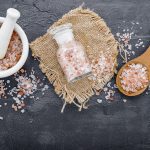No more dry skin!
If dry, flaky skin has you feeling uncomfortable, you’ve come to the right place. Whether it’s chilly weather, indoor heating, or just your skin’s natural condition, battling dryness can be frustrating.
Let’s dive into a few easy tips and remedies that will help you wave goodbye to dry skin for good. Hint: dewy, glowy skin has a lot to do with hydration, hydration and more hydration…
Quick Read:
- Use skin-loving ingredients to transform your skin from parched to perfectly hydrated.
- Try not to take super hot showers or baths as these can dry out your skin.
- Sunblock is a must – every day! Yes, even for darker skin.
Dry skin culprits
Dry, itchy, flaky skin is a common problem for many people. If you’re prone to dry skin, it probably worsens in winter.
Colder weather, especially in winter, reduces humidity in the air, causing skin to lose moisture. On the flipside, dry, windy climates can also strip moisture from your skin. A no-win skin situation, in many ways!
This is why it’s important to take care of, and nourish your skin, from the inside out. Just as your body thrives on good nutrition and plenty of water, so too does your skin.
Remember, your skin is your body’s largest organ, so it needs lots of tender loving care! Be careful about using random products and trying too many skincare routines. Stick with what works for your skin type.

Dry skin is also caused by:
- Excessively hot showers and baths. The hot water may feel lovely, but it can strip away your skin’s natural oils that protect and hydrate your skin.
- Fragrances and harsh chemicals in soaps, cleansers and skincare products can disrupt your skin’s natural barrier, making it more prone to dryness.
- As we get older, our skin naturally starts to produce less oil and becomes drier.
- Dehydration is a big dry skin culprit – your skin needs water.
- Dry skin can also be caused by conditions like eczema or psoriasis.
- Do you moisturise regularly? Not applying lotion regularly can quickly lead to dry and itchy skin.
- Some medications, such as those for acne or high blood pressure, may have a drying effect on your skin as a side-effect.
- Not enough essential fatty acids, vitamins or minerals in your diet can dry out your skin.
All aboard the hydration train
Now that we understand a few of the triggers of dry skin, let’s find solutions.
- Drink up! Make sure you’re getting enough water every day. Spice up plain water with sprigs of mint or orange slices for flavour.
- Pat your skin dry after a shower and moisturise your body while your skin is slightly damp. This will help your skin to better absorb the lotion.
- Remember what we said about those hot showers – make sure the water isn’t too hot.
- When shopping for skincare products, choose items that are light on fragrances and harsh chemicals.
- The same goes for soaps and bath gels. They may smell nice, but all those fragrances can irritate your skin.
- For very dry skin, apply a layer of Vaseline at night for extra moisturisation.
- Try not to scratch dry skin because it can lead to an infection.
- Look for moisturisers with ingredients like glycerin, hyaluronic acid or shea butter, which generally offer more moisturisation and hydration. Ask at the pharmacy for oil-based moisturisers; these are usually better suited for dry skin.
- It may seem like a good idea to “scrub” off your flaky skin but you need to be gentle with your skin. Skip the rough washcloths and harsh scrubbing, which can further irritate dry skin.
Help at hand
Dry skin is usually uncomfortable and annoying, but if you start to notice any worrying symptoms, please see a doctor or skin specialist.
- Watch for intense itching, redness or swelling; these signs could point to a serious condition like eczema or dermatitis.
- Don’t ignore cracked or peeling skin, especially if it starts to bleed as this increases the risk of infections.
- If your dry skin becomes painful, warm to the touch or shows signs of infection (such as pus or yellow crusts), it’s time to see a doctor.
- If you notice other symptoms, like weight loss, constant tiredness, or a change in your nail colour, please see a doctor. These could be signs of a bigger health problem like diabetes or thyroid issues.
Images: Pixabay



















